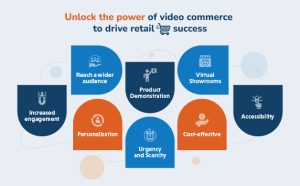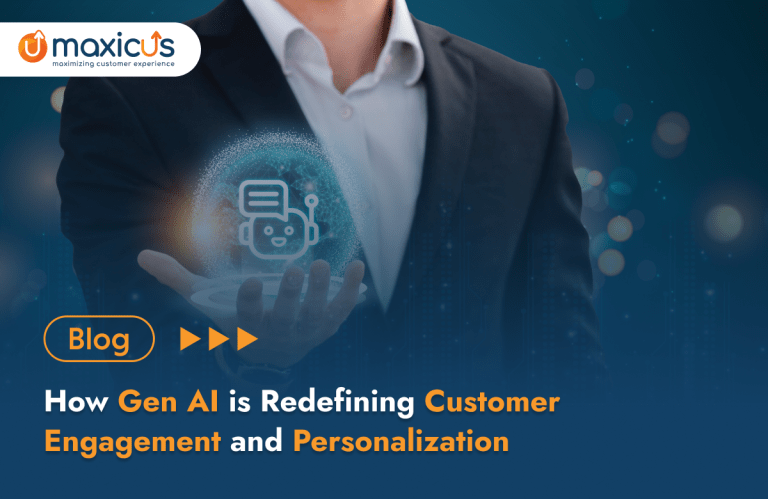How video commerce is the way forward for the retail industry?
The retail industry is going through a significant transformation, and video commerce is becoming increasingly important for retailers to stay competitive in today’s market. Video commerce, also known as v-commerce, is the use of videos to sell products and services online.
This includes everything from live streaming to pre-recorded product demos, and it is rapidly becoming a fundamental way for retailers to connect with customers and drive sales.
One of the main advantages of video commerce is that it allows retailers to create a more engaging and interactive shopping experience for customers. Businesses can use videos to showcase products in a way that text and images cannot, making it easier for customers to understand the features and benefits of a product.
Creating a sense of urgency and driving customers to make a purchase can also be achieved by using videos. For example, live streaming can be used to develop an understanding of exclusivity and scarcity, encouraging customers to purchase before the live stream ends.
Live stream shopping: What is it, and which industries are leveraging this platform?
Another advantage of video commerce is that it allows retailers to reach a wider audience. Retailers can use videos to connect with customers and drive sales by sharing them across multiple platforms like social media and YouTube.
Video commerce also allows retailers to communicate with customers who may face difficulty in physically visiting a store, like those living in rural areas or with mobility issues.
Video commerce can also be used to personalize the customer experience. Retailers can use video analytics to gather data on customer behavior and preferences and then use that information to create targeted marketing campaigns.
For example, Retailers can create videos tailored to specific customer segments by using data on customer demographics and browsing history. This can help to increase customer engagement and drive sales.
Phygital virtual commerce is also becoming increasingly important in the retail industry. Phygital retail refers to integrating physical and digital elements in the retail experience.
This includes using technology such as virtual reality, augmented reality, and artificial intelligence to enhance the customer experience and provide a seamless shopping experience across multiple channels.
Retailers can use virtual reality to create virtual showrooms where customers can try on clothes or test out products in a realistic setting. This improves the customer experience and allows retailers to gather valuable data on customer preferences, which can inform future product development and marketing efforts.
Explore The Possibilities Of Next-Gen Virtual Commerce With Phygital
Look how video commerce can help the retail industry

Increased engagement
Video commerce allows retailers to create a more engaging and interactive shopping experience for customers, which can help to increase customer engagement and drive sales.
Reach a wider audience
Retailers can connect with customers and reach a wider audience by sharing videos across multiple platforms.
Personalization
Video analytics gather data on customer behavior and preferences to create targeted marketing campaigns and personalize the customer experience.
Product Demonstration
Video commerce allows retailers to showcase products in a way that text and images cannot, making it easier for customers to understand the features and benefits of a product.
Urgency and Scarcity
Retailers can use live streaming to create a sense of urgency and scarcity, encouraging customers to make a purchase before the live stream ends.
Virtual Showrooms
“Customers can try on clothes or test out products in a realistic setting by using virtual reality to create virtual showrooms.”
Cost-effective
Video commerce can be a cost-effective way for retailers to connect with customers, as it doesn’t require the exact costs of traditional brick-and-mortar stores.
Accessibility
Video commerce enables retailers to reach out to customers who cannot physically visit a store, such as those living in remote areas or those with mobility challenges.
The use of artificial intelligence in video commerce is also becoming increasingly popular. AI can be used to personalize the customer experience and provide customized recommendations.
For example, Retailers can utilize Artificial Intelligence (AI) to gain a better understanding of their customers’ behavior and preferences. With this information, they can create targeted marketing campaigns that are tailored to specific groups of customers. Additionally, AI can assist with inventory management by predicting demand and adjusting stock levels accordingly. This helps retailers ensure that they have the right products in stock at the right time.
The Virtual shopping experience has become a crucial aspect of the retail industry in recent years. With the advancement in technology, retailers can now create a more immersive and interactive shopping experience for customers through the use of virtual reality and augmented reality.
Deliver A Personalised Shopping Experience at Home
A Virtual shopping experience allows customers to shop from the comfort of their homes and enable them to explore products in a realistic setting. It allows customers to see the product in action, view it from different angles, and understand how it would look in real life.
Retailers can also use Virtual shopping experiences to create virtual events, such as fashion shows, which customers can attend worldwide. The Virtual shopping experience has become a powerful tool for retailers to attract and retain customers, ultimately resulting in increased sales and revenue.
Conclusion
Retailers need to use videos more to stay competitive. Videos make shopping more fun and reach more people.
Additionally, we can use video analytics to gather data on customer behavior and preferences and create targeted marketing campaigns.
Phygital virtual commerce & the use of technology like virtual reality, augmented reality and artificial intelligence in online shopping can make the experience better for customers and make it easier to shop across different platforms.
As technology continues to evolve, we can expect to see more retailers embracing video commerce and phygital strategies in order to stay competitive in today’s market.










